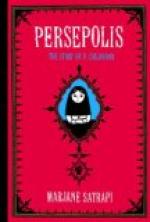“You do not love me,” said the little spoilt child, pushing him away; but the boy shook his head and smiled, and went on his way through the tall yellow corn, seeing as in a vision some day in a fair future when he should come into that old familiar land and ask Alois of her people, and be not refused or denied, but received in honor, whilst the village folk should throng to look upon him and say in one another’s ears, “Dost see him? He is a king among men, for he is a great artist and the world speaks his name; and yet he was only our poor little Nello, who was a beggar, as one may say, and only got his bread by the help of his dog.” And he thought how he would fold his grandsire in furs and purples, and portray him as the old man is portrayed in the Family in the chapel of St. Jacques; and of how he would hang the throat of Patrasche with a collar of gold, and place him on his right hand, and say to the people, “This was once my only friend”; and of how he would build himself a great white marble palace, and make to himself luxuriant gardens of pleasure, on the slope looking outward to where the cathedral spire rose, and not dwell in it himself, but summon to it, as to a home, all men young and poor and friendless, but of the will to do mighty things; and of how he would say to them always, if they sought to bless his name, “Nay, do not thank me,—thank Rubens. Without him, what should I have been?” And these dreams, beautiful, impossible, innocent, free of all selfishness, full of heroical worship, were so closely about him as he went that he was happy,—happy even on this sad anniversary of Alois’s saint’s day, when he and Patrasche went home by themselves to the little dark hut and the meal of black bread, whilst in the mill-house all the children of the village sang and laughed, and ate the big round cakes of Dijon and the almond gingerbread of Brabant, and danced in the great barn to the light of the stars and the music of flute and fiddle.
“Never mind, Patrasche,” he said, with his arms round the dog’s neck as they both sat in the door of the hut, where the sounds of the mirth at the mill came down to them on the night-air,—“never mind. It shall all be changed by and by.”
He believed in the future: Patrasche, of more experience and of more philosophy, thought that the loss of the mill-supper in the present was ill compensated by dreams of milk and honey in some vague hereafter. And Patrasche growled whenever he passed by Baas Cogez.
“This is Alois’s name-day, is it not?” said the old man Daas that night from the corner where he was stretched upon his bed of sacking.
The boy gave a gesture of assent: he wished that the old man’s memory had erred a little, instead of keeping such sure account.
“And why not there?” his grandfather pursued. “Thou hast never missed a year before, Nello.”
“Thou art too sick to leave,” murmured the lad, bending his handsome young head over the bed.




